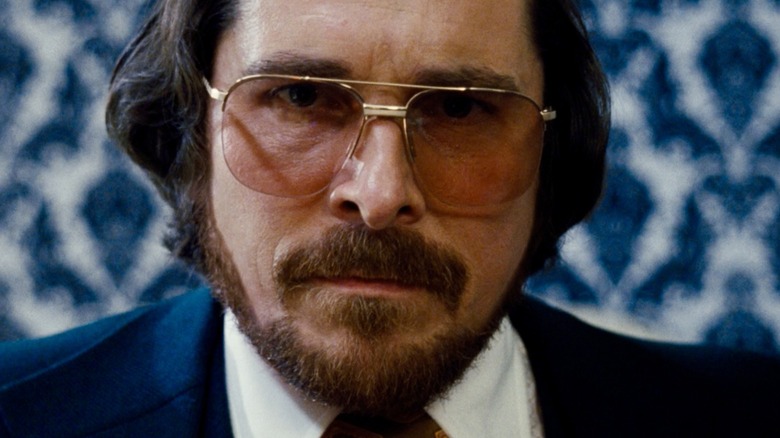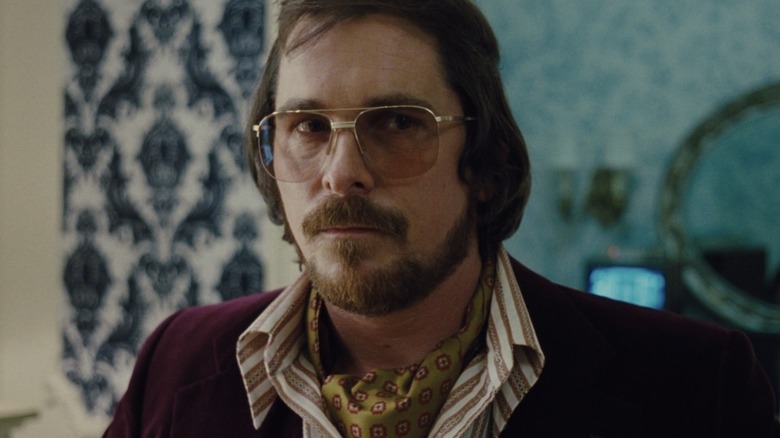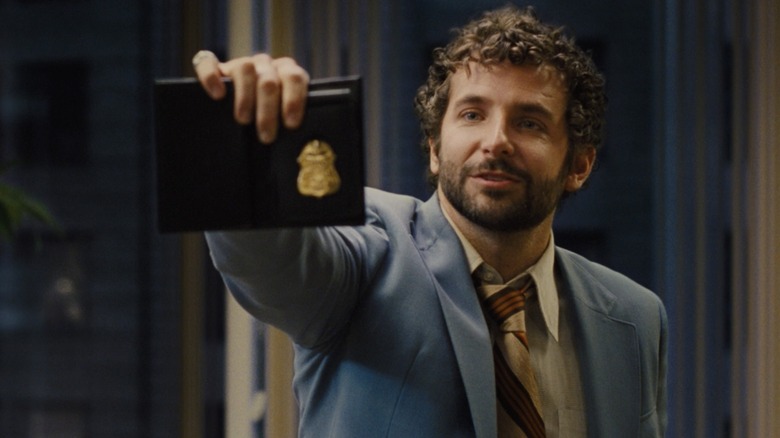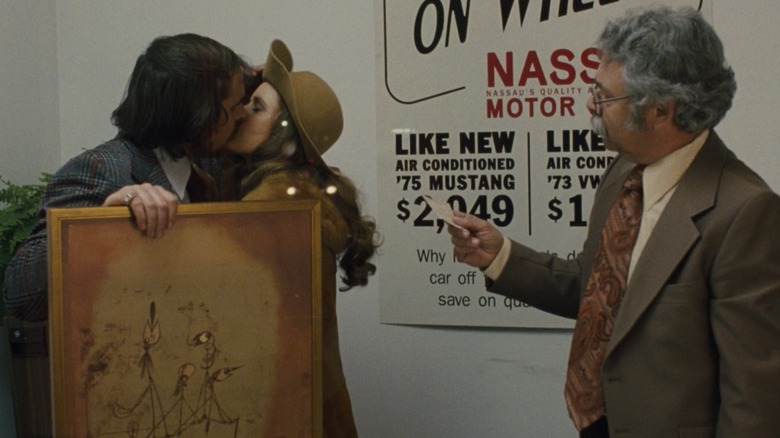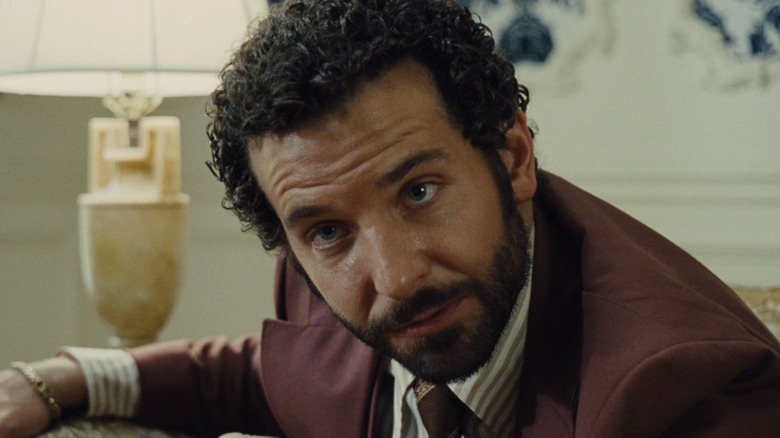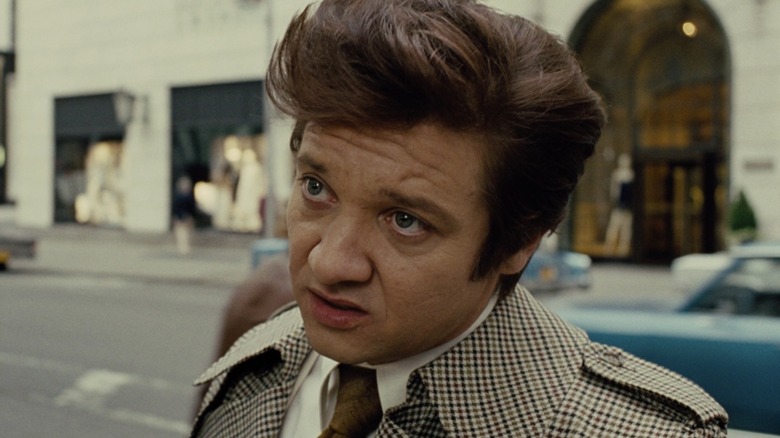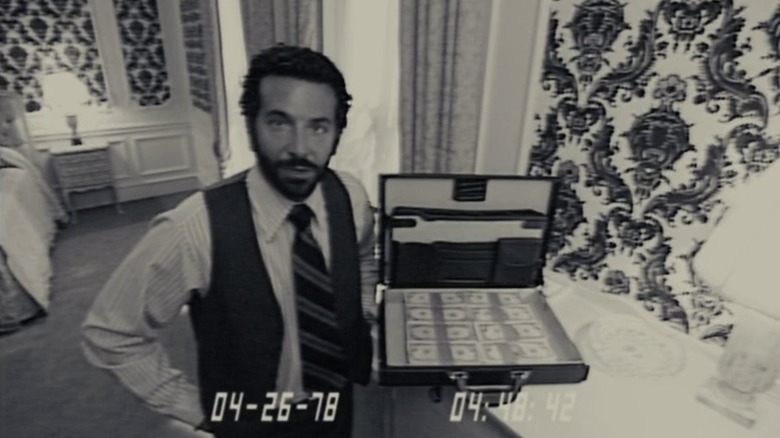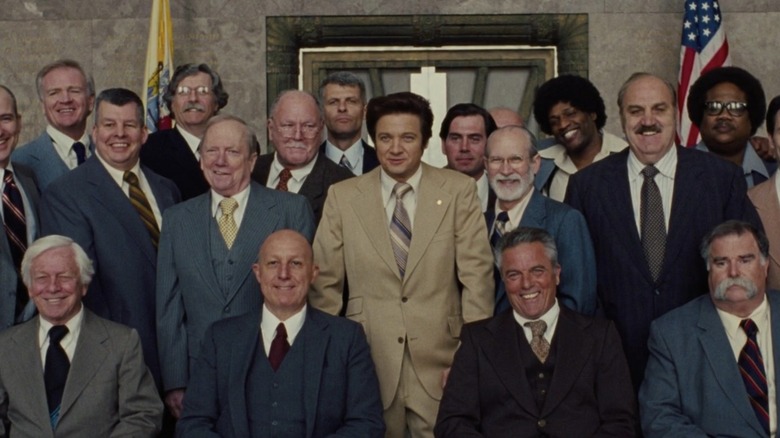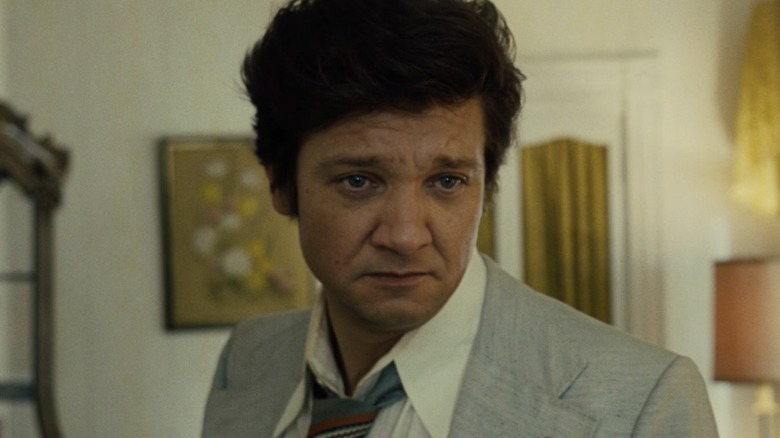Everything American Hustle Doesn't Tell You About The True Story
Director David O. Russell's "American Hustle" is one of those rare films that fires on all cylinders. Its star-studded cast includes Christian Bale, Amy Adams, Jennifer Lawrence, Bradley Cooper, and Jeremy Renner. This highly-rated, Oscar-nominated, commercial success comically explored the FBI Abscam corruption probe conducted during the late '70s, which targeted politicians who took bribes for favors. Scriptwriter Eric Warren Singer told SF Gate, "I pulled back the veneer and ... learned about the human drama of what happened, which was so textured and rich and funny and bizarre. Here was this sort of stranger-than-fiction story that had not been told before."
"American Hustle" begins with the title card, "Some of this actually happened," setting the farcical tone of the movie while clueing the audience into the fact that a true story inspired the film. As reported by The New York Times, the film is based loosely on Mel Weinberg's authorized biography, "The Sting Man," by Robert W. Greene. But Singer and Russell didn't let historical accuracy stop them from putting their own spin on the story, including the creation of a fictional side-plot. The result is an engaging and hilarious period movie about corruption which argues that nearly everyone is guilty of running a con in their life, even if they are only conning themselves.
Keep reading to explore everything "American Hustle" doesn't tell you about the true story.
Christian Bale's character is based on Mel Weinberg
Irving Rosenfeld, played brilliantly by Christian Bale, is the hustler at the center of "American Hustle" and was based on real-life con man Mel Weinberg. As reported by The New York Times, Weinberg was born in the Bronx and grew up with two older sisters. He dropped out of high school and joined the Navy during World War II. After he returned from the war, Weinberg worked with his father, installing windows. Slate confirmed that, as depicted in the film, Weinberg increased business by breaking more windows. According to Time, Weinberg later owned a chain of dry cleaners and a glass installation business, while becoming a confidence man who swindled people desperate for a risky loan through his shady business, London Investors.
According to The Washington Post, Weinberg sold the film's producers the rights to his life story for $250,000. Despite the name change, Weinberg is apparently portrayed accurately in the movie. In 2014, after "American Hustle" was nominated for 10 Oscars, Weinberg told ABC News that the depiction of him in the film was realistic. "Christian Bale, I think, did a great job," Weinberg said while acknowledging that he did wear his hair in an elaborate comb-over. "He nailed it, in terms of what Mel Weinberg was." Weinberg spoke to The New York Times in 2017 in preparation for his obituary, saying, "I've had a good life, a charmed life." He died in Florida in 2018 at 93 years old.
Amy Adams' character is based on Evelyn Knight
Amy Adams' character in "American Hustle," Sydney Prosser, becomes Irving Rosenfeld's mistress after they meet at a pool party. Sydney helps Irving with his scams, using a fake English accent and taking on the new identity of Lady Edith Greenley to add class and authenticity to the London Investors grift. According to Time, Adam's character was based on Mel Weinberg's real-life mistress, Evelyn Knight, but unlike in the film, Knight actually was British rather than an American pretending to be a Brit.
As reported by Slate, Knight did help Weinberg with his scams, although her role was relatively minor and she was not the full-on partner depicted in the film. As reported by The New York Times, it was Weinberg who was arrested in 1977, tried, and convicted of fraud and conspiracy. Weinberg pleaded guilty to protect Knight when she was also threatened with prosecution.
As Weinberg told ABC News, Knight didn't take part in the Abscam plot like Adams' character in the film did, but he confirmed that they did get married and raised his adopted son together as shown at the end of the movie. Weinberg added that Knight "didn't like the way she was portrayed." Knight was also not involved in a love triangle with an FBI agent as depicted in the movie — that was a Hollywood embellishment (per Time). Although Weinberg and Knight divorced in 1998, she still confirmed his death to The New York Times.
Weinberg was approached by the FBI after he was sentenced to prison
As reported by Politico, the FBI approached Mel Weinberg to take part in an operation after he was sentenced to three years in prison, not in a deal to avoid prosecution as depicted in the film. Weinberg's sentence was reduced to probation and he became an undercover FBI operative, who was reportedly well-paid for his work as the lynchpin of Abscam.
According to 60 Minutes, Weinberg's agreement with the FBI included four sting operations as depicted in "American Hustle," but after those stings were completed, he kept working with the FBI as an undercover operative during Abscam "strictly for the money." Weinberg didn't see the difference between scamming for himself or scamming for the FBI.
This is something we repeatedly see when it comes to Weinberg. He was always looking for an angle and a new way to make money. To his credit, he was always honest about that, admitting that it was always about the payout for him, and it was never personal. In 2014, prior to the Academy Awards, Weinberg told ABC News that he hoped "American Hustle" brought some Oscars home, saying, "Maybe I'll see some money."
Abscam didn't start as a political corruption probe
Although Abscam evolved into a political corruption operation, it started out with Weinberg taking down con artists like himself. We see this in "American Hustle," when Irving Rosenfeld explains the principles of a successful con to Richie DiMaso (Bradley Cooper) while discussing various scams that they could run using a false sheikh. The film quickly moves into Abscam and corruption, skipping the early scams Weinberg ran for the FBI, when Carl Elway (Shea Whigham) brings Camden mayor Carmine Polito (Jeremy Renner) into the picture.
In reality, as reported by Vulture, Weinberg's relationship with the FBI began with Weinberg helping to recover stolen paintings. This might be where Rosenfeld's interest in selling forged and stolen art at the beginning of the film comes from. In "The Sting Man," we learn that after Weinberg helped recover the paintings, the insurance company gave him a $10,000 finder's fee, and he realized that working for the FBI "as a government crook" might be lucrative.
After recovering the paintings, Weinberg continued working with the FBI in various scams involving his fake sheikh, luring marks who wanted to borrow the sheikh's money or help the sheikh invest in real estate in the U.S. Per The Daily Beast, it was when William Rosenberg suggested that the Camden mayor Angelo Errichetti was on the take and could help the sheikh attain permits for a casino in Atlantic City that the FBI operation turned toward political corruption.
Richie DiMaso is a composite character
According to The Washington Post, Bradley Cooper's character, Richie DiMaso, is a composite character based on a few FBI agents who worked on Abscam, including John Good, Tony Amoroso, and Jack McCarthy. According to Slate, DiMaso's closest real-life counterpart was Amoroso, whom Mel Weinberg was impressed with while working undercover with him. Weinberg told ABC News that he thought the film was hard on the FBI, saying, "They weren't as bad as it looks in the movie."
DiMaso is depicted as an ambitious agent who turns into a volatile, coke-snorting madman when he discovers that he enjoys the excitement of being involved in a scam. DiMaso gets carried away, blurring the lines between his undercover persona and his position as a federal agent by engaging in an affair with Amy Adams' character. He also pummels his supervisor, Stoddard Thorsen (Louis C.K.), with a telephone base when Thorsen won't give DiMaso everything he wants for the operation.
John Good, a consultant on the film, told The Washington Post, "None of that ever happened." But he acknowledged that the filmmakers took dramatic license with the story because "if they just did it the way Abscam was done, it would be a very boring movie." Despite being a composite, DiMaso is integral to the fictional side-plot, which involves Adams' character running a long con on the FBI. But Weinberg's mistress was not involved in Abscam, and none of the FBI agents had an affair with her.
Jeremy Renner's character is based on a real mayor
The movie's mayor of Camden, Carmine Polito, is a sympathetic character who genuinely loves his constituents. Polito only gets involved with Irv Rosenfeld's sheikh and investment scam because he thinks it will help his community rebuild the casinos in Atlantic City and bring jobs to his economically depressed New Jersey region. Renner's Polito is likable, which plagues Rosenfeld with guilt in the film because he comes to think of Polito as a friend.
According to Slate, Polito's real-world counterpart, Angelo Errichetti, was indeed the mayor of Camden, New Jersey, and was known for being corrupt, despite also being loved by his community. In reality, Mel Weinberg and Errichetti developed a friendship, just as depicted in the film. Weinberg told 60 Minutes unequivocally that he liked the mayor, saying that if he had met Errichetti earlier in life, they would have been partners in crime running scams together.
Although "American Hustle" accurately depicts the friendship between Polito and Rosenfeld and positions Polito as the crux of the Abscam corruption angle, Mel Weinberg didn't con the FBI to get a reduced sentence for the Camden mayor as Rosenfeld does in the film. According to Time, the long con involving the mob attorney, Alfonse Simone (Paul Herman), and a wire transfer was pure fiction. Weinberg told NJ.com, "He was a nice guy. But he was just an unbelievable crook," suggesting that Weinberg believed Errichetti got what he deserved.
Jennifer Lawrence's role was based on Cynthia Marie Regan
Jennifer Lawrence's character Rosalyn was based on Mel Weinberg's second wife, Cynthia Marie Reagan, known as Marie Weinberg after their marriage. Although Irving Rosenfeld's wife Rosalyn is depicted as being much younger than Rosenfeld in "American Hustle," Marie Weinberg was in reality closer to her husband's age (Weinberg was in his 50s), while his mistress Evelyn Knight was younger (via The Guardian).
Weinberg's only complaint about the film was regarding Lawrence's casting, telling ABC News, "The mistress should always be hotter than your wife." According to Time, there is no evidence that Marie had an affair with a mobster as Rosalyn does in the film, nor did she complicate matters by divulging information to the mob about her husband's business dealings related to Abscam.
According to The New York Times, Weinberg and his wife Marie bought a condo and moved to Florida in 1979. Marie asked for a divorce and they separated after she learned that her husband's mistress followed them to Florida. Tragically, Marie died by suicide in 1982 after telling 20/20 that her husband accepted gifts from Abscam marks, like the microwave Carmine Polito gives Rosenfeld in the film. Mel denied these accusations, telling 20/20 that he turned over everything he was given to the FBI, although 20/20's investigation suggested otherwise.
If you or anyone you know is having suicidal thoughts, please call the National Suicide Prevention Lifeline at 1-800-273-TALK (8255).
A Lebanese FBI agent played Sheikh Abdul
Sheikh Abdul is played by a Mexican-American FBI agent, Paco Hernandez (Michael Peña), who finds the operation's name, Abscam (short for Arab Scam), offensive. With this character, the film gives credence to real-world complaints about the name of the operation, suggesting it was racist. The film also plays with the failure of the first FBI agent who posed as a sheikh. According to The Guardian, that agent, Mike Dennehy, had Irish ancestry and didn't speak a word of Arabic.
Per The Washington Post, one allegedly embarrassing but hilarious incident is dramatized in the film when the mobster Victor Tellegio (Robert De Niro) speaks Arabic to the sheikh at an impromptu meeting in Atlantic City, but the sheikh doesn't know how to respond. In real life, that sheikh was replaced by a Lebanese-born FBI agent who knew some Arabic. According to Slate, Weinberg also invited politicians and grifters, including Mayor Angelo Errichetti, to a party cruise in Florida on a yacht purported to be owned by Sheikh Abdul, but actually owned by the FBI. This watery interlude is not depicted in "American Hustle."
The politicians' payoffs didn't happen at the Plaza Hotel
Unlike the way they were depicted in "American Hustle," the payoffs to corrupt politicians who accepted cash to fast-track the sheikh's citizenship and facilitate other favors didn't happen rapid fire at the Plaza Hotel in New York City. According to The Washington Post, they actually went down in Washington D.C.'s Georgetown neighborhood, at a colonial red-brick house that the FBI had sublet from a Washington Post journalist. The latter was on assignment elsewhere and none the wiser about the government operation transpiring within the walls of their home.
Although the FBI did use the Plaza Hotel to impress marks as part of the scam, it was not where the congressmen were recorded accepting bribes. Former FBI agent John Good, who supervised the Abscam operation between 1978 and 1980, told the Washington Post that the Georgetown home "was wired completely. I watched all of the payoffs go down, every single one of them."
Weinberg worked as a private investigator after Abscam
"American Hustle" ends on a cheerful note: Rosalyn and her mobster boyfriend are together and making a go of co-parenting with Irving and Sydney, who get married. The film depicts Irving and Sydney as going legit, first by getting a traditional loan from a bank and then opening a legitimate art gallery after their time working for the FBI is done.
In reality, according to The Los Angeles Times, Weinberg worked on a counterfeit luxury handbags investigation in the 1980s for Louis Vuitton and Gucci, using the skills he learned from his time with the FBI and as a crook. According to The Hollywood Reporter, Weinberg continued supporting himself and his family in his later years with his dry-cleaning business chain and by working as a director of security for Louis Vuitton. Weinberg's New York Times obituary added that he worked as a private investigator in Miami for over a decade after Abscam and retired in 1994.
Abscam was a very successful operation
According to Slate, Abscam "was the largest bribery scandal in the history of Congress." Per Vulture, only 10 members of Congress had ever been convicted of bribery prior to Abscam; according to The Guardian, Abscam led to 19 convictions, including one senator, six congressmen, and the mayor of Camden. Per The Washington Post, Abscam was the largest political corruption probe the FBI had conducted up to that time, with over 100 agents working on it, and became the biggest scandal since Watergate after videos of politicians accepting bribes were made public.
Although the convictions created a scandal, people also questioned the methods that the FBI employed, including letting a known con man run point on the operation. Despite these criticisms, Weinberg stood by his work. As reported by The Washington Post, Weinberg told the author who wrote his biography, "There's only one difference between me and the congressmen I met on this case. The public pays them a salary for stealing." Weinberg doubled down on his stance in an interview with 60 Minutes, calling the politicians caught up in the Abscam scandal "a bunch of perverts, drunks, and crooks."
Abscam opened public discussions about entrapment
Just because Mel Weinberg thought these corrupt politicians got what they deserved didn't mean everyone agreed with his assessment. Despite the convictions and many rejected appeals, the Abscam operation and the scandal that followed led to a public outcry, with some accusing the FBI of entrapment. When asked about Abscam's methods, Weinberg told 60 Minutes, "We put the big honey pot out there, and all the flies came to us."
As reported by Slate, the Justice Department revamped its rules for undercover operations to avoid future accusations of entrapment, but the damage was done and everyone caught up in the scandal would pay for their involvement. Jeremy Renner's character, Carmine Polito, is how the filmmakers inject this debate into "American Hustle" — by making Polito a sympathetic character who tried to walk away but got reeled in by a con artist who told him it would offend the sheikh if he didn't take the money.
According to The Washington Post, the Senate and House conducted hearings to discuss entrapment, but the videos of politicians accepting bribes made it difficult to argue their innocence, and the quotes pulled from the videos made the defendants sound dishonest. One of the most outrageous quotes shows up in Irving Rosenfeld's monologue at the end of the film, borrowing the line "larceny in their blood" from South Carolina congressman John W. Jenrette Jr. who, according to The New York Times, was recorded as saying, "I got larceny in my blood."
